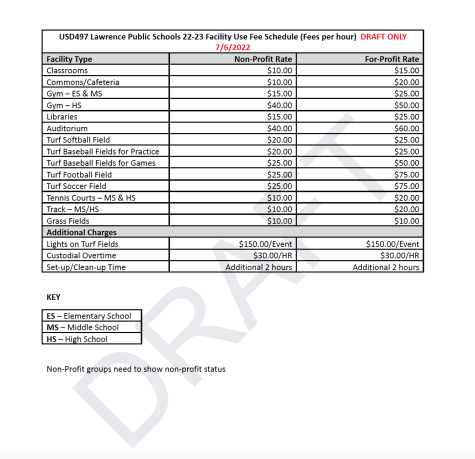NEWS: Coaches “Blindsided” By Increasing Facility Rental Fees
Confusion among sports coaches stirs discussion with district after a new Facility Use Schedule was released in July with increased rates
October 28, 2022
As the district reviews facility rental fees, sports teams may now have to pay the district the same fees charged to outside groups for their summer workouts and camps, in accordance with a new fee schedule drafted this summer (below). 
Under the proposal, any Free State or Lawrence High sports program charging for off season training would be required to pay anywhere from $20 to $50 per hour, plus a potential $30 per hour custodial fee (if custodians are not already on duty).
SUMMER PARTICIPATION FEES
Some coaches charge athletes to participate in summer workouts or camps. For example, volleyball charges $100 to participate in summer camp, which covers two hours worth of camp, a t-shirt, insurance, and adds to the scholarship fund for athletes wanting to attend but unable to pay. Football charges $50 for summer workouts five days a week all summer. The new facility rental fees drafted this summer could mean the district takes a cut of those profits, which several coaches have not previously been charged for or have been charged significantly lower rates.
On July 1, varsity volleyball coach Jayme Savage received an invoice for $1,800 for one week of camp using two gyms, charging court usage at a rate of $30 an hour. Savage said this came as a surprise, as the team previously was charged $20 to $25 per day total, adding up to approximately $100 for the full week.
“We had never seen these kinds of fees before… with that kind of money being charged, we would lose money,” Savage said.
After addressing her concerns with the district, Savage said volleyball’s invoice was reduced to $480. Dr. Larry Englebrick, Executive Director of Facilities and Operations (who has held the position since March 1, 2021), said the newly drafted fee schedule was passed on to him from his predecessor and part of a normal fee review process. He acknowledged that coaches had come to him with concerns.
FEE REVIEW PROCESS
“We’ve attempted to keep our fees, number one, in line with neighboring districts and in line with what we’ve charged in the past,” Englebrick said. “ What really started this was they [coaches] sent in facility use agreements, we sent them back with the fees. [Coaches responded,] ‘Whoa, what’s going on?’ …And then we had discussions with each individual that sent those in.”
Englebrick said as of now, the district has put most of the invoices on hold and told the coaches they don’t have to pay them, unless a coach thought the fee was fair and then they expected them to pay.
The fee rates alarmed some coaches and could have potentially restricted the team’s ability to host summer camps or workouts. Because school sports teams cannot apply for 501(c)3 nonprofit status, most coaches would have to reallocate money from their general sports fund or participate in additional fundraising efforts to pay the for-profit rates, which is typically used to fund team resources, competitions and gear.
IMPACT OF SUMMER PROGRAMS
Although some coaches have expressed the new fees would dampen their summer preparation, Athletic Director Jered Shaw believes that holding camps over the summer is important and didn’t think the new fee schedule would have a big impact on summer offerings.
“It’s a massive competitive advantage if you have a significant or a robust system in place for summer workouts,” Shaw said. “And more physically, even, it gives you camaraderie as a team. It gives you extra time together, which is the best part.”
At Free State, four additional head coaches were interviewed, who said they were glad that this issue is being reported on but were hesitant to go on the record with exact numbers, citing not wanting to cause conflict between their program and the district. Journalists from The Budget at Lawrence High are also reporting on the issue from their school in collaboration with FSJournalism.
KSHSAA REGULATIONS
Englebrick said KSHSAA summer rules and regulations dictate the fee schedule, and could not definitively say if summer workouts would be charged or only summer camps. For example, if a team does not host an official camp but offers weekly summer workouts for a set fee, Englebrick thought that might mean all workouts throughout the summer fall under the “camp” umbrella, leading to hourly facility fees for each individual workout. That means if a program hosts six hours of workouts a week, that could amount to anywhere from $120 per week (tennis courts) to $450 per week (football or soccer fields).
Savage believes the Facility Usage Fee rates may affect athlete participation as teams may be forced to increase participation fees if the facility rates are also increased.
“I think it definitely impacts smaller programs,” Savage said. “And for some if scholarships are not available, it could hinder their ability to participate.”
COACHES ADDRESS CONCERNS WITH DISTRICT LEADERSHIP
Savage organized a meeting with other coaches in the district from both high schools to discuss these new fees with Englebrick.
“Confusion set in and so we wanted to get on the same page… [in order] to benefit high school coaches and programs,” Savage said.
The meeting led to a series of further meetings discussing how to make these fees more equitable for coaches and teams. When asked about the history behind these fees, Englebrick expressed that he did not know how these fees were managed prior to him being the Executive Director of Facilities and Operations.
“I don’t know what they paid in the past, I don’t know what they were invoiced in the past, I don’t know if they paid their invoices in the past,” Englebrick said. “We’ve got to figure out a way to get this resolved, and that’s what we’ve been working on.”
NON-SPORTS EVENTS
On the fee schedule, classroom, auditorium and building space fees are listed. When asked if Student Council or other student groups would be charged to use spaces during for-profit activities like school dances where $10 admission is charged, Englebrick said no because, “we can’t put them under school activities because of KSHSAA rules.” Student Council is an official KSHSAA-regulated activity (along with debate, music, scholar’s bowl, and more), but it doesn’t have a designated “season,” meaning they wouldn’t be charged for “offseason” activities.
DRAFT CHANGES
District administration is now working on creating a revised Facility Use Fee Schedule that would answer the concerns of coaching staff across the district. Englebrick hopes for the process to be complete by February in order to provide clear rates to the coaches and prepare for the ‘23-’24 school year.
Englebrick expressed that the district does not intend for complications amongst the district’s teams and coaching staff. He also said although facility rental fees were brought up during the budget conversations last year, he does not believe any fee collected would provide profit for the district.
“We’re are not the big bad terrorists you thought we were,” Englebrick said.
As more information gets released, Free State Journalism will be providing updates on fsfreepressonline.com









